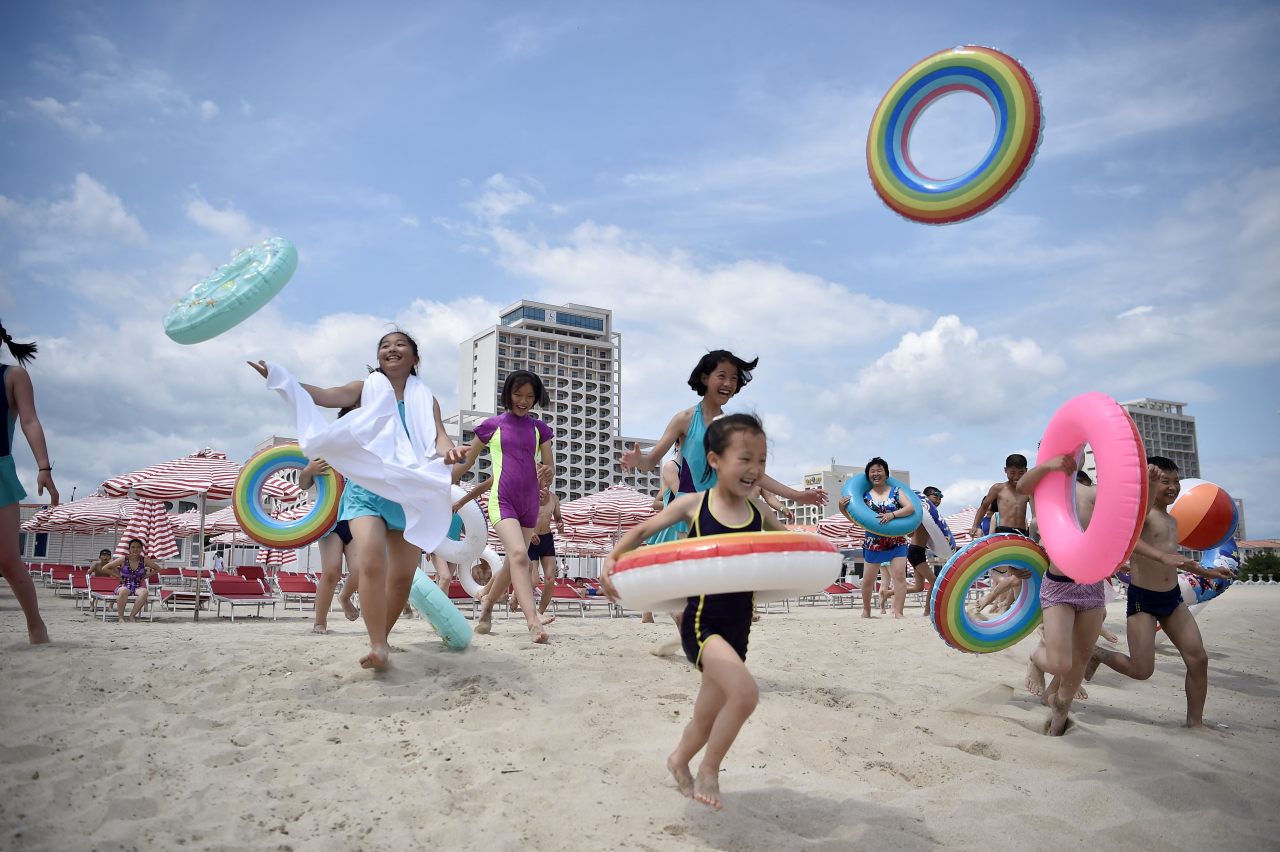
A Glimpse into North Korea’s New Beach Resort
North Korea’s Wonsan Kalma coastal complex offers a unique blend of luxury and isolation, providing a rare opportunity for foreign visitors to experience the country’s latest attempt at modernization. Located on the eastern coast, the resort features pristine white sand beaches and crystal-clear waters, creating an idyllic setting that contrasts sharply with the nation’s usual image. However, the experience is not without its peculiarities.
For instance, the cost of Wi-Fi is steep—ten minutes of internet access runs approximately $1.70. While food is plentiful, the beverage selection remains limited to water, tea, or beer. Despite these quirks, the weeklong trip costs roughly $2,000, and all travelers must be Russian. This exclusivity highlights the limited scope of tourism in North Korea, which has been heavily restricted due to international sanctions and geopolitical tensions.
A Firsthand Account from a Russian Tourist
Anastasia Samsonova, a 33-year-old human-resources specialist from Moscow, was among the first group of foreign tourists allowed to visit the resort. She chose a group tour that included several days in Pyongyang before arriving in Wonsan. Upon stepping onto the beach, she was surprised by the emptiness. “The entire beach was empty,” she said. “In fact, we seemed to be the only guests in the entire resort.”
Despite the lack of other visitors, the service was exceptional. When the group requested porridge and brioche buns, staff quickly delivered them. Portable music speakers were hand-delivered on the beach upon request, and patio chairs for the balcony arrived instantly. Samsonova described feeling like “the most important people on Earth” during her stay. She also took home a souvenir—a statuette shaped like a nuclear warhead.
The Political Motives Behind the Resort
North Korea once welcomed hundreds of thousands of foreign tourists annually, mostly from China, before closing its borders in early 2020 due to the pandemic. The country reopened to tourism in February 2024, but only for Russian travelers. According to a Russian official from Vladivostok, about 1,500 vacationers visited last year.
Starting in February 2024, North Korea allowed certain Western tourists to visit a special economic zone near the Chinese border, but the tours were later halted without explanation. As a result, only a few nationalities can currently enter the country. The U.S. State Department has prohibited American citizens from entering since 2017.
Kim Jong Un has long promoted the Wonsan Kalma resort as part of his vision to showcase North Korea’s modernity and prosperity. He mentioned the project in his New Year’s address in 2018, and the resort’s design was inspired by Spain’s Benidorm. The complex includes plans for high-rise hotels, a casino, and shopping malls.
Challenges in Attracting International Tourists
Eric Ballbach, a Korea Foundation fellow at the German Institute for International and Security Affairs, noted that North Korea’s major construction projects often have ideological angles. Trips to the resort for regular North Koreans are likely rewards for loyalty, he added.
However, attracting a real boom in foreign tourism remains a challenge. Rowan Beard, co-founder of Young Pioneer Tours, a travel agency specializing in North Korea tours, pointed out that most tourists are more interested in seeing Pyongyang’s military sites and monuments rather than lounging on the beach.
The Experience of Russian Tourists
The 13 Russian tourists who visited Wonsan had to pay $1,400 in addition to around 35,000 rubles ($435) to a Russian tourist agency. Meals, flights, and other travel expenses were covered, but snacks, incidentals, and extra leisure activities were not.
The group included several couples and well-traveled, affluent individuals. There were no children. During their journey, they were abruptly told to travel to Wonsan by train instead of flying, which some attributed to the arrival of Russian Foreign Minister Sergei Lavrov. The train ride took about 10 hours over 120 miles, slowed by the country’s aging railroad tracks.
Daria Zubkova, a 35-year-old veterinarian from St. Petersburg, enjoyed the train ride and observed North Korean villages along the way. She encountered almost no restrictions on what she could photograph or film. On her Instagram page, she posted videos of Heineken beer, Lego-style toy tanks, and a bus with the slogan, “We work for the people!”
Unique Features and Experiences
At Wonsan, the visitors were told there were separate beaches for locals and foreigners. The water park, featuring pools, hot tubs, saunas, and slides, was off-limits. To make purchases, Russians used electronic payment bracelets, needing U.S. dollars, euros, or Chinese yuan to add prepaid funds. Rubles weren’t accepted.
A bottle of beer cost about 60 cents, while a face massage ran $15. A plastic model of North Korea’s Hwasong-17 intercontinental ballistic missile fetched $465. The weapon, which has the potential to strike the U.S. mainland, was flight-tested at least three times.
Zubkova asked how much it would cost to rent a jet ski and quad bike, but the North Korean worker didn’t know how much to charge, so it was free. She said she now has a long list of friends eager to visit North Korea.
Growing Pains and Unpredictable Experiences
Alexander Spevak, marketing manager of the Russian tourist group that organized the trip, noted that the resort has experienced some growing pains. For example, hotel cleaning staff ignored the “Do Not Disturb” sign on his door. He set the water boiler to a higher temperature for a shower, but staff repeatedly entered his room and turned it down.
During Lavrov’s visit, the resort became packed with North Korean visitors. Spevak assumed they were elites based on their smartphones and nicer clothes. However, when the visitors were handed swimsuits, goggles, and hats, they waded into the water en masse. This included Spevak’s tour guide, who clung to one of the Russian tourists for hours in the water.
“Our guide couldn’t swim!” Spevak said. “She was so scared.”
Despite the unpredictability, the trip ended on a positive note. The canceled round-trip flight to Wonsan prompted the North Koreans to issue each Russian traveler a refund of $200 in cash.
